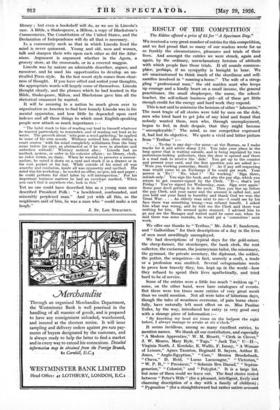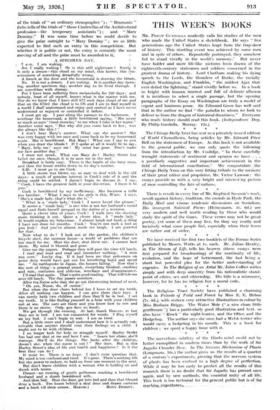RESULT OF THE COMPETITION
The Editor offered a prize of £5 for "A Specimen Day."
WE received a very great number of entries for this competition, and we feel proud that so many of our readers wrote for -us so frankly the circumstances, pleasures and trials of their lives. And amongst the entries we were struck, again and again, by the ordinary, 'unexclamatory_ heroism of attitude with which people face those trials. It all sounds common- place, "perhaps, if no sympathy is brotight to bear. We are unaccustomed to think much of the sturdiness and self- sacrifice involved in " runnings home." The wife of a strop. gling "profeasional man," the old maiden aunt who keeps up courage and a kindly heart on a small income, the general -practitioner, the small shopkeeper, the nurse, the school- teacher, the • self-reliant -business girl—all of these get little enough credit for the energy and hard work they expend.
This is not said to minimize the heroism of other " labourers." The most tragic of all stories were told- by -men on the dole, men who tried hard to get jobs of any kind and found that nobody wanted them, men who, through unemployment, began to feel, in drab despair, that they might become " unemployable." The mind, as one competitor expressed "it, had lost its objective. We quote a vivid and bitter picture from " Teribus " . . . To-day is pay-day--for some—at the Bureau, so I make tracks for it and arrive sharp 2.15. You take your place in- the long queue that is waiting outside, and is being regulated by two portentous-looking policemen, then the door is opened and there is a mad rush to receive the dole.' You get up to the counter and present your card, and the first question you are asked is- ' Were you working yesterday, Smith ? ' As if any self-respecting man would come to an Exchange if he could get work. Your answer is No ! " No, what ? " No working." Sign there, initials only.' You sign the book, and also the pay slip, which you return to get counter-signed by the Clerk. D—, that's not Friday ! You've signed for Wednesday,-man. Sign over again.' Some poor devil getting it in the neck. Then you line up before the pay Clerk, and your name and the amount is called out, and you hold out your hand in humility and thank God we won the Great War.. . . An elderly man next to me—I could see by his face there was something wrong—was refused benefit. I asked him what was wrong, and he told me the Clerk said there was nothing for him. He seemed quite stunned. I advised him to go and see the Manager and waited until he came out,- when he said there was some mistake, he would get a `committee' next week.
- We offer our thanks to " Teribus," Mr. John F. Sanderson, and " Galloridian " for their descriptions of a day in the lives
of men most unwillingly unemployed. •
We had descriptions of typical days for the gold-miner, the sheep-farmer, the storekeeper, the bank clerk, the rent collector, the exciseman, the.journeyman tailor;the missionary, the gymnast, the private secretary, the diplomat, the soldier, the potter, the sempstress—in fact, scarcely a craft, a trade -or • a profession was Omitted. Several octogenarians wrote to prove how "bravely they, too, kept -up in the world—how
they refused to spend their lives apathetically, and tried . _ hard to be of service.
Some of the entries were a little too much `.!..written up " ; some, on the other hand, were bare catalogues of events. But there were ten times more entries of very great merit than we could mention. Not all were tales of labcirious days, though the tales of weariness overcome, of pain borne cheer- fully, have naturally left most effect on us. Miss Pauline Toiler, by the way, introduced her entry (a very good one) with a strange piece of information :—
" By knocking my head six times on the bedpost the night before, I always manage to awake at six o'clock.' -
It seems invidious, among so many excellent- entries, to mention names. We thank all our contributors, and-especially ". A Modern Apprentice," W. M. Bissett, " Clerk in Clover," J. W. Meares, Mary Ryle; " Tugs," " Jack Ttir," • Virginia North, J. Kerslake, E. Wallis, F. Isinay,_`, A Woman of Leisure," Agnes Taunton, Reginald B. Sayers, Arthur E. Jones, " Anglo-Egyptian," " Cam," Monica Brooksbank, " Chava," D. Reid, " Lucas Lacassagne," " Victorian," " W. P. B.," " Proviseur," " Solamin Ben Daoud,". " Septua- genarian," " Colonist," and " Polyglot." It is a large list, but none of them could we leave out.' The final. choice rested between " Peter's Wife " (for a pleasant, 'intelligent, livetyind charming description of a day with a family of children) ; " Pygmalion " (for a straightforward but rather satiric account
of the trials of " an ordinary stenographer ") ; " Bramante " (who tells of the trials of " those Cinderellas of the Architectural profession—the temporary assistants "); and " Mary Dominy." It was some time before we could decide to give the prize outright to " Mary Dominy " ; we so little expected to find such an entry in this competition. But whether it is politic or not, the entry is certainly the most moving of all and the prize must be awarded.to
A,.SPECIMEN 'DAY.
t 7 a.m. I am waking. Am I really waking ? Or is this still nightmare ? Surelx it is only a dream—this cloud on my mind, this horror, this. con- sciousness of something dreadfully wrong.
A knock at the door and the housemaid is drawing the blinds.
No. It is not a dream. I am waking. It is another day dawn- ing, another specimen day, another day to be lived through. I am speechless with dismay.
For I have been suffering from melancholia for 240 days : and nobody, least of all myself, knows what is the matter with me. Nor do we know that I have still 672 such days ahead of me and that on the 673rd the cloud is to lift and I am to find myself in a world I shall understand and enjoy and control as I have never understood or enjoyed or controlled it before.
, I must get up. I pass along the passage to the bathroom. I overhear the housemaid, a little bewildered saying. " She never so much as says ` Good morning' to me when I te,ke in her water." Another voice says, " But why did you come back to her ; was she always like this ? "
I don't hear Mary's answer. What can she answer ? She was very happy with me once and came back to be my housemaid again. She is bewildered. But Mary ! What can I say to you when you draw the blinds ? If I spoke at all it would be to say, " Mary, help me ! save me ! My mind has gone. Don't make me face another day."
I must not speak. What can Mary do ? Harley Street has failed me once, though it is to save me in the end.
Breakfast is fairly easy. There is the bustle of the busy ones, and then the house settles down to its day's routine.
• 9.30. I must go to see Cook.
A little storm was blown up, so easy to deal with in the old days : a touch of genuine interest in Cook's side of it and the .thing could be settled. I daren't begin to discuss it. I say, '" Cook, I have the greatest faith in your discretion. I leave it to you." Cook is bewildered by my inefficiency. She becomes a trifle too familiar. What I says to the girls is this, M'am. I says, ` She's a made lady, that's what she is. "
" What is a ' made lady,' Cook ? I never heard the phrase." It seems a " made lady " is one who is not her husband's social equal and finds herself unequal to the duties of a mistress. Quito a clever idea of yours, Cook ! I walk into the drawing roomthinking it out. Quite a clever idea. A "made lady. It would explain my behaviour. I almost laugh out loud, a thing I have not done for months. Cook ! You're not such a fool as you look ! And you've almost made me liugh. I am grateful for that.
Now what to do ? I look out at the garden, the children's bicycle shed, the summer house—a world of problems that are too much for me. Shut the door, shut them out. I cannot face them. My mind is blurred and gone.
• Give me the papers. Perhaps they will pass the time till lunch. - .I read and read and read and remember nothing. " A man run over." Lucky dog. If it had been me that policeman on point duty would have put out his interfering hand and saved me. " An earthquake in Japan, the houses falling." Now that's the sort of thing—a general smash, everything finished, crashing and ruin, confusion and oblivion, wreckage and disappearance.
I'll read that again. That's quite good reading. That will tide me over till lunch. The day passes somehow. After tea Nurse asks may she go out this evening instead of next. " Oh yes, Nurse, do, of course."
But when the door closes behind her I have to set my teeth. After all nothing can happen. I can give them their toys. I can surely bath two children and then they'll be in bed. I set my teeth. It is like finding yourself in a boat with your children out at sea. The oars are there and you know how to row and there is no storm. Only, you have no haneti.
We get through the evening. At last, thank Heaven, at last they are in bed. I am too exhausted for words. I fling myself On my bed. I can't begin to rest. I am so tired. - But a little more and I shall understand how it is actually con- ceivable that anyone should vent their feelings on a. child. I ought not to be with children.
- I no longer look for help or• struggle myself: Harley Strribt has had one shot at me and here I am. " Leave her alone, she'll manage. She'll do the things. She looks - after the childrqn, doesn't she. when the nurse is out ? " She does. But is this Harley Street's idea of life and health and happiness ? Is it the best they can do ? - It must be. There is no hope. I don't even question that. My mind is too confused and tired. It's gone. There s.nothing left but the power to endure, to hold on from one moment to the next.
But don't leave children with a woman who is holding on and dumb with terror.
Dinner—an evening of gentle politeness masking a bewildered husband, and a dumb bewildered wife.
And then bed. Shut the door, get into bed and then that blessed drug a book. Ten hours behind a shut door. 'and drawn curtains
and a book till sleep comes. Heaven l MARY DOMINIC.











































 Previous page
Previous page